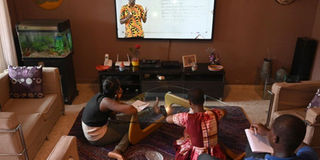Prime
Education ministry advised to set up TV station for learning purposes

Plan B . Children take school lessons on television at their home following the outbreak of Covid-19. PHOTO | FILE
What you need to know:
- In their recommendation on provision and uptake of alternative learning methods in Uganda’s secondary schools in periods of shocks, the economists in the research findings stated that in the television station there should be no advertisements but should have a clear programme on learning for various classes.
Makerere University economists have advised the Ministry of Education and Sports to set up its own Radio and Television stations that do not require monthly subscription purposely for learning.
In their recommendation on provision and uptake of alternative learning methods in Uganda’s secondary schools in periods of shocks, the economists in the research findings stated that in the television station there should be no advertisements but should have a clear programme on learning for various classes.
Among many other recommendations, the research economists say the government should increase the supply of well-written and detailed reading materials, distribute learning materials to upcountry areas, sensitize and encourage e-learning countrywide.
Presenting the research study finding which was carried out in 20 districts in dissemination meeting held at Makerere University on February 17, the lead researcher Dr John Mutenyo said: “Government should laisse with telephone companies to provide personalized smartphones and tablets, network-locked with special telephone lines for students for learning purposes such that in case of loss of a smartphone, it cannot be used elsewhere. The government should negotiate with internet providers such that access to education websites should be free of charge hence requiring no data.”
The emergency study on provision and uptake of alternative learning methods in Uganda’s secondary schools in periods of shocks was funded by the government of Uganda through a research and innovation fund code named Makerere Research Innovation Fund (MAK-RIF), which has seen Makerere University coming up with 500 research projects under it.
The research findings reveal that challenges encountered while using different methods of alternative learning when using radio, majority of the respondents agreed that it is very hard to understand what being is taught if one cannot see the teacher.
Challenges
When using television there is a challenge of monthly subscription fees, the challenge of unstable electricity and signals which makes them miss some lessons.
Challenge of studying by newspapers, a considerable number of students mentioned that they cannot consult and get clear explanations about the concepts in the newspapers. When using WhatsApp, the majority of the respondents observed that data is expensive let alone additional expenditure on OTT. Respondents also reported poor network connections as a big challenge.
School Website: One needs to buy a lot of data bundles which is costly especially in times of lockdown.
Challenge of handouts from the Ministry of Education and Sports: The Ministry provided complicated notes which are very hard to understand. The copies were insufficient and inaccessible to most schools and a number of students.
Responding to the research findings, Principal Education Officer in the Ministry of Education and Sports, Mr George Mukose said going forward the Ministry is working on a comprehensive preparedness and emergency response policy for education. “The policy will articulate education interventions in emergency situations and how they are funded and managed,” he said.
“Secondly, the Ministry is also developing the ICT in education policy. While plenty of opportunities exist for expeditious adoption and scale up of ICT in education, a policy framework needs to be in place to support the process. In the curriculum reforms, the focus is now on lifelong learning. Instead of focusing on giving knowledge to the learners, emphasis is to be shifted to equipping the learner with the skill of learning, which would support learning beyond the classroom,” he explained.
Mr Mukose said the Ministry is expediting the development of the private provision of education policy.



